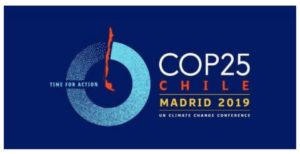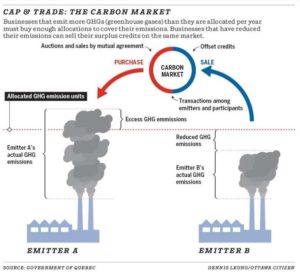UPSC Articles
ENVIRONMENT
TOPIC: General Studies III
- Conservation, environmental pollution and degradation, environmental impact assessment
COP25: Longest climate talks end

Daily Current Affairs IAS | UPSC Prelims and Mains Exam – 17th December 2019
Context:
- The 25th annual talks under the United Nations Framework Convention on Climate Change (UNFCCC), referred to as the Conference of Parties (COP), was recently held in Madrid.
- It ended without any outcome.
- It was the 15th meeting of the parties for the Kyoto Protocol (CMP15), and also, it was the second meeting of the parties for the Paris Agreement.
- The prime objective of the conference is to complete the rule-book to the 2015 Paris Agreement that will become effective in 2020 to replace the 1997 Kyoto Protocol (comes to an end in 2020).
Conference of Parties (COP)
- The COP is the supreme decision-making body of the Convention.
- All States that are Parties to the Convention are represented at the COP, at which they review the implementation of the Convention and any other legal instruments that the COP adopts and take decisions necessary to promote the effective implementation of the Convention.
- The first COP meeting was held in Berlin, Germany in March, 1995.
Kyoto Protocol 1997
- The Kyoto Protocol is an international treaty which extends the 1992 United Nations Framework Convention on Climate Change (UNFCCC) that commits state parties to reduce greenhouse gas emissions, based on the scientific consensus that (part one) global warming is occurring and (part two) it is extremely likely that human-made CO2 emissions have predominantly caused it.
- That protocol legally bound developed countries to emission reduction targets.
- However, the agreement was widely believed to be ineffective because the world’s two top carbon dioxide-emitting countries, China and the United States, chose not to participate
Paris Agreement, 2015
- Paris Agreement or COP21 was adopted in December 2015.
- It aimed to reduce the emission of gases that contribute to global warming.
- The Paris Agreement also aimed at replacing the Kyoto Protocol(to strengthen emission reductions, in 1997)
Aims of Paris Agreement
The aim of the agreement is to decrease global warming, enhancing the implementation of the UNFCCC through:
- Holding the increase in the global average temperature to well below 2 °C above pre-industrial levels .
- Increasing the ability to adapt to the adverse impacts of climate change.
- Making finance flows consistent with a pathway towards low greenhouse gas emissions and climate-resilient development
- This strategy involved so-called 20/20/20 targets, namely the reduction of carbon dioxide (CO2) emissions by 20%, the increase of renewable energy’s market share to 20%, and a 20% increase in energy efficiency.
COP 25: Focus
- Ambitions for this conference were limited because many countries were focused on narrow technical details such as the workings of the globalcarbon markets.
- It was hoped that countries would resolve to work on more ambitious carbon targets needed to fulfil the goals of the 2015 Paris agreement.

Daily Current Affairs IAS | UPSC Prelims and Mains Exam – 17th December 2019
Why CoP25 failed?
- The failure of the talks underlined starkly the massive gap between what scientists say the world’s nations need to do on climate change, and what the most powerful political leaders on the planet are prepared to even discuss.
- According to scientist, talks focused on some of the rules for implementing the 2015 Paris agreement, but the overriding issue of how fast the world needs to cut greenhouse gas emissions has received little official attention.
- Countries agreed in Paris in 2015 to revisit their climate pledges by 2020. But many countries were pushing this year for a clear call for all countries to submit more ambitious climate pledges next year.
- But countries such as China and Brazil opposed placing any obligation on countries to submit enhanced pledges next year, arguing it should be each country’s own decision. They instead argued the focus should be on pre-2020 action by developing countries to meet their previous pledges
- There was a recognition that tougher carbon targets are needed globally, but few countries came up with any and the resolve to come back next year with more ambitious plans was worded too weakly to satisfy most campaigners.
India’s stance:
- India played a mixed role at the recently concluded 25th Conference of Parties (CoP 25) to the United Nations Framework Convention on Climate Change at Madrid.
- On the question of markets, India emphasised the transition of the Clean Development Mechanism (CDM) credits earned under the Kyoto Protocol to the Paris Agreement.
- Pointed out that that excessively cheap emissions reductions enabled by the CDM as well as the possibility of double counting could corrupt the process.
- India played a strong role in critiquing the developed world’s continuing poor record on climate action.
- It argued that unless a stocktaking exercise of the fulfilment of various pre-2020 commitments by developed countries ,India would not raise its climate ambition for its next round of Paris Agreement targets due in 2020.
- India also took a lead in calling for more finance for developing countries for climate action, (“not even 2 per cent” of the promised “$1 trillion in the last 10 years” had been delivered)
Way forward
- It is entirely appropriate for countries such as India to insist on not taking on an even more unfair share of the global mitigation burden unless developed countries deliver on the minimal parameter of fulfilling their existing promises.
- It is crucial that India continue to push developed countries in this fashion as the entire global climate action framework has been put in jeopardy by the inaction of big polluters.
Connecting the dots:
- Do you think COP25 climate summit has ended in staggering failure of leadership?
- Do you think Climate change is Real?














